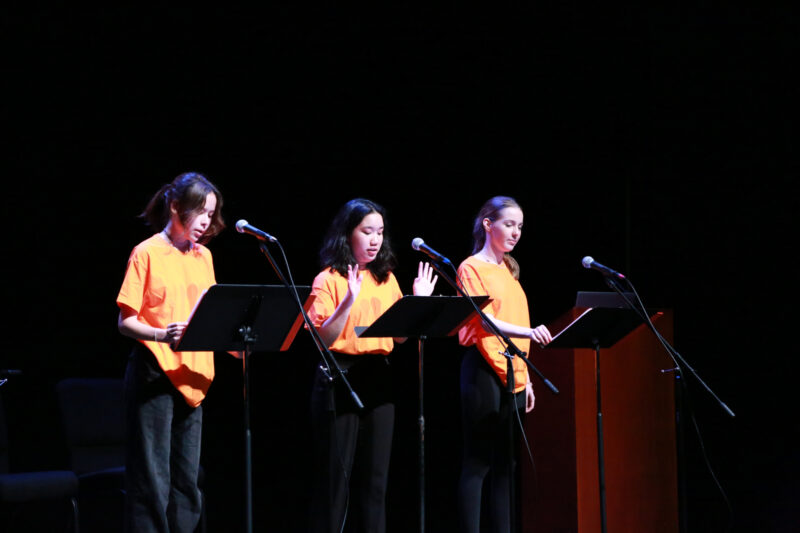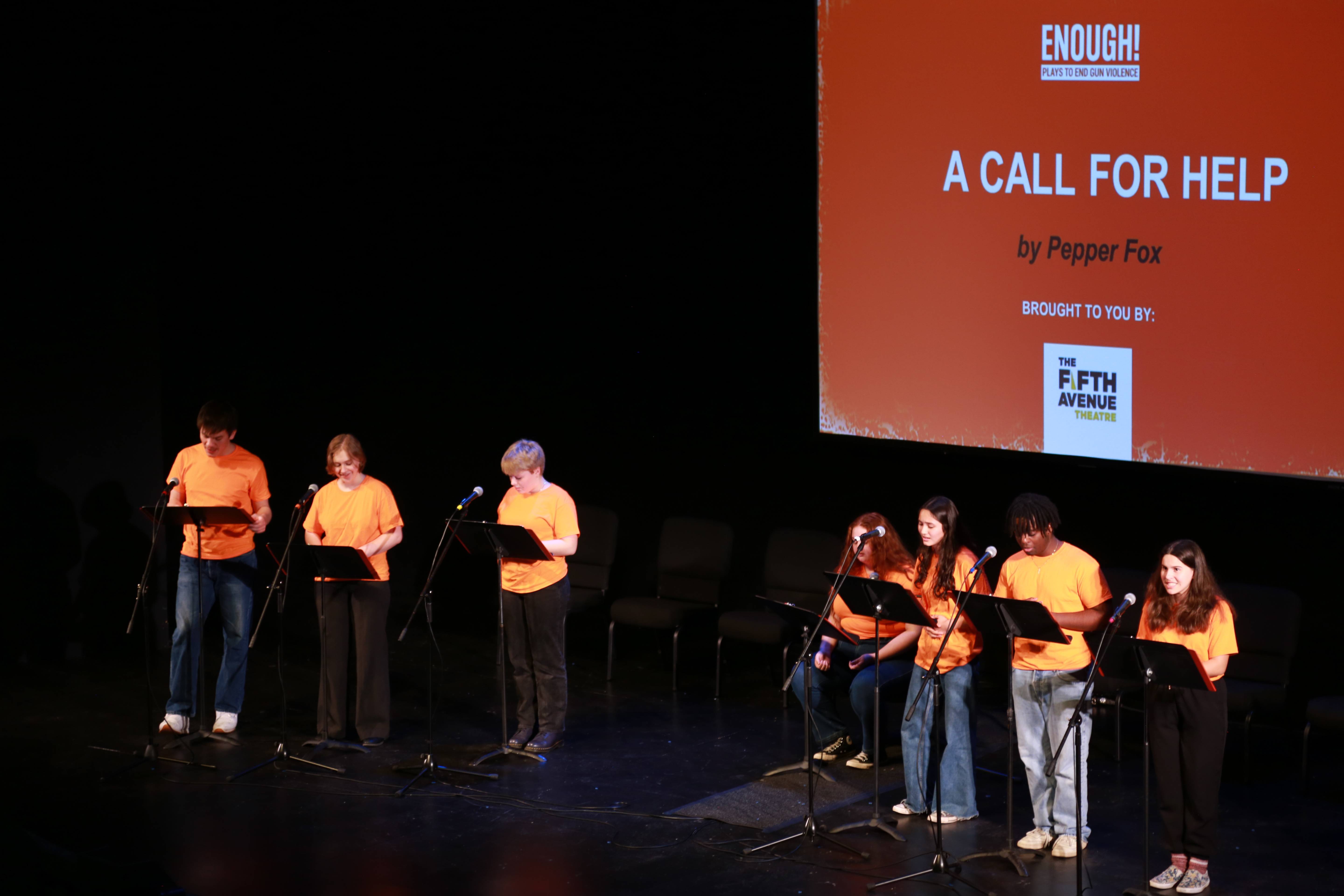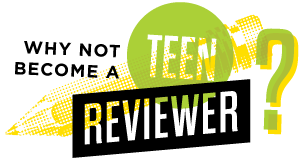How ENOUGH! Uses Theater to Discuss Gun Violence
Written by TeenTix Newsroom Writer Mickey Fontaine

In America, gun violence has been rising since the 90’s, taking tens of thousands of lives in the process. It is undeniable that this has become a crisis; some have even called it an epidemic. Gun death has become so common in our culture it’s hard to find the motivation to create change. With another tragedy sweeping through the nation every month, how can there be hope for a better future?
This is especially prevalent for youth. This generation has grown up in a country plagued by gun violence, living with shooter drills, teen suicides, and accidental deaths, making this their everyday life. This makes youth voices critical in the discussion of gun violence.
ENOUGH! PLAYS TO END GUN VIOLENCE recognizes the value of the youth experience and highlights their perspectives by giving a nationwide stage to young playwrights so they can address the tragedy of gun violence through theater and incite meaningful conversation and community action.
Seeing young artists being given space to express themselves is always refreshing and eye-opening, so I was very excited when I got the opportunity to attend this year’s production of ENOUGH!
ENOUGH! PLAYS TO END GUN VIOLENCE is a nationwide program that offers space for young playwrights to be heard. Every year, they select six plays that best grapple with the subject of gun violence and present them across the country all on the same night. The performance I attended was in collaboration with the Seattle Children’s Theatre, The 5th Avenue Theatre, and the Alliance for Gun Responsibility, and I have to say, they did an excellent job.
The show was deeply thoughtful, inspiring, and enjoyable. It offered many unique and diverse insights into the crisis of gun violence, all written and performed by young artists.
To put the viewer in the victim's shoes, each play used a unique and provocative blend of techniques and styles. They ranged from domestic dramas to rap ballads and didn’t always abide by the laws of reality. They play with time, such as in The Smiles Behind, where a little girl completely stops time to confront the police officer chasing her brother, or in Lightning Strike, which spans decades and tells the life story of a traumatized school shooting survivor who regrets being unable to save their peers.

They also span many different genres, which allowed the different writers' styles to prosper. They all centered on a core theme, but each play still had a unique narrative and style. Some were more traditional, such as A Disorderly Home, which subtly depicted a couple's conversation in a single location, while others took a more subversive approach, such as No Prospering Weapons, which blended the lines between theater, hip-hop, and spoken word to paint a dramatic, almost musical, picture of tragedy that had me at the edge of my seat.
Even though each play was very different, the transitions didn’t feel jarring. Their variety added intrigue rather than confusion. If the plays had all been constrained to a singular form or genre, then the different perspectives and styles of the writers would have been as well.
The plays were less impactful when they became tools to teach a one-sided lesson. Even though using theater to incite meaningful change is the entire basis of the event, some plays occasionally sacrificed their artistic merit for shock value or emotional appeal. It’s easy and eye-catching to bluntly depict the reality of gun violence, but much harder to look at it in a nuanced manner.
This felt present in Lightning Strike, which rephrased the same concepts (survivor guilt, PTSD, school shootings) without offering many unique or evocative insights into them. The additional exercises and discussions that took place before and between the plays also felt one-sided. For me, it wasn’t necessary to interrupt the show to do mindfulness exercises; it took me out of the moment and took my focus off of the plays. I didn’t come for a reminder that gun violence is bad; I came to have my mind changed and to enjoy good theater.
The plays worked best when they went against my expectations. To give a well-rounded, interesting view on such a complex topic with nuance and originality, one needs to do some rule-breaking. The goal was to grab attention and motivate critical thought, and I felt this was best achieved when they deviated from the standard play. The tragic truth of gun violence was best represented when it was abstracted, such as in A Call for Help, where the desperate voices of gun victims and 911 operators chaotically overlapped, creating a staggering sense of scale, or No Prospering Weapons, which blurred the lines between victim and perpetrator as they traded increasingly fast verses of spoken word that would overlap and interplay with one another.
When a show is built around a political idea, writers tend to create characters or scenarios that justify a message rather than feel realistic or relatable. The plays featured in ENOUGH! rarely succumbed to this. The character's experiences felt very genuine, and they all had an element of humanity, even those behind the gun, such as in No Prospering Weapons or The Smiles Behind. It didn’t feel like the writers had conjured up weak characters to add sympathy to the show's message; they felt like real, complicated people with flaws and motivations. It recognized the humanity of a nervous cop, unaccepting parents, or a desperate gunman, which added a sincere element to their composition.
ENOUGH! seeks to change minds, and it certainly succeeded. The characters, in both writing and performance, were deeply relatable, and the ideas were unique and well-composed, only occasionally sacrificing subtly for emotional appeal. It took on a monumental problem in a bold and creative way and managed to balance political messaging and believable writing.
Lead photo credit: Youth performers in ENOUGH! Photo by Tally L and Zeppelin, Youth in Focus student photographers
The TeenTix Press Corps promotes critical thinking, communication, and information literacy through criticism and journalism practice for teens. For more information about the Press Corps program see HERE.
This reviews was written by a TeenTix Newsroom writer on special assignment through the TeenTix Press Corps.


